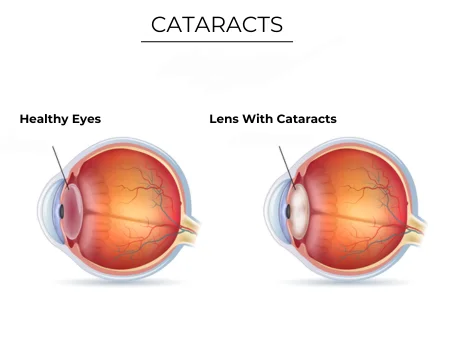
Cataract Surgery
Discover expert cataract care at EyeCare, offering advanced surgical options and personalized treatment to restore clarity and protect your vision
What is Cataract?
A cataract occurs when the natural lens of your eye becomes cloudy, causing blurred vision, difficulty with night driving, glare, and fading colors. It is a common condition that typically develops with age, but may also result from diabetes, long-term medication use, or eye injury.
Cataracts cannot be treated with glasses or medication. Surgery is the only effective treatment once vision is significantly affected.
Get Consultation with Cataract Surgery Expert
Causes of Cataract
- Aging – most common cause.
- Genetics – family history increases risk.
- Medical Conditions – diabetes, high blood pressure.
- Long-term Medication – particularly steroids.
- Lifestyle Factors – smoking, alcohol use.
- UV Exposure – excessive sunlight over time.
Get Consultation with Cataract Surgery Expert

Symptoms of Cataract
Symptoms of Cataract
- Blurry or cloudy vision.
- Trouble with night vision.
- Sensitivity to light and glare.
- Frequent changes in eyeglass prescription.
- Colors appearing faded or yellowed.
- Double vision in one eye (in rare cases).

Advantages of Phacoemulsification (Phaco) at EyeCare
- Sharper Vision – precise, reliable results with high-quality lens implants.
- Quick Recovery – small incision means less discomfort and faster healing.
- Minimal Dependence on Glasses – advanced lens technology reduces or eliminates need for glasses after surgery.
- Enhanced Safety – minimally invasive, with reduced risk of complications.
- Comfort-focused – shorter procedure time, less discomfort during and after surgery.
Treatment Procedure: Phaco vs SICS
Phacoemulsification (Preferred Option)
- A tiny incision is made in the cornea.
- An ultrasound probe breaks the cloudy lens into small fragments.
- Fragments are gently removed, and a clear artificial lens (IOL) is implanted.
- No stitches are required, and recovery is rapid.
Small Incision Cataract Surgery (SICS)
- A slightly larger incision is made.
- The cloudy lens is removed in one piece.
- An artificial lens is implanted.
- Healing time is longer compared to Phaco.
Our dedicated counsellers will guide you through cost details, helping you choose the most suitable and effective option for your vision needs.
Post-Treatment Care After Cataract Surgery
- Use prescribed eye drops as directed.
- Avoid rubbing or touching your eye.
- Shield your eye from dust and water.
- Wear sunglasses for
- UV protection
- Restrict strenuous activities.
- Attend follow-up appointments
Book an Appointment

Testimonials
Read inspiring stories from patients who have experienced clearer vision and compassionate care with EyeCare, reflecting the trust and results we strive for every day
Frequently Asked Questions
A. No, it is usually painless. Local anesthesia ensures comfort during the procedure.
A. Most patients resume normal activities within a few days after Phaco surgery.
A. Many patients experience clear vision without glasses, depending on the lens implant chosen.
A. No, surgeries are usually done one eye at a time, with a short gap in between.

